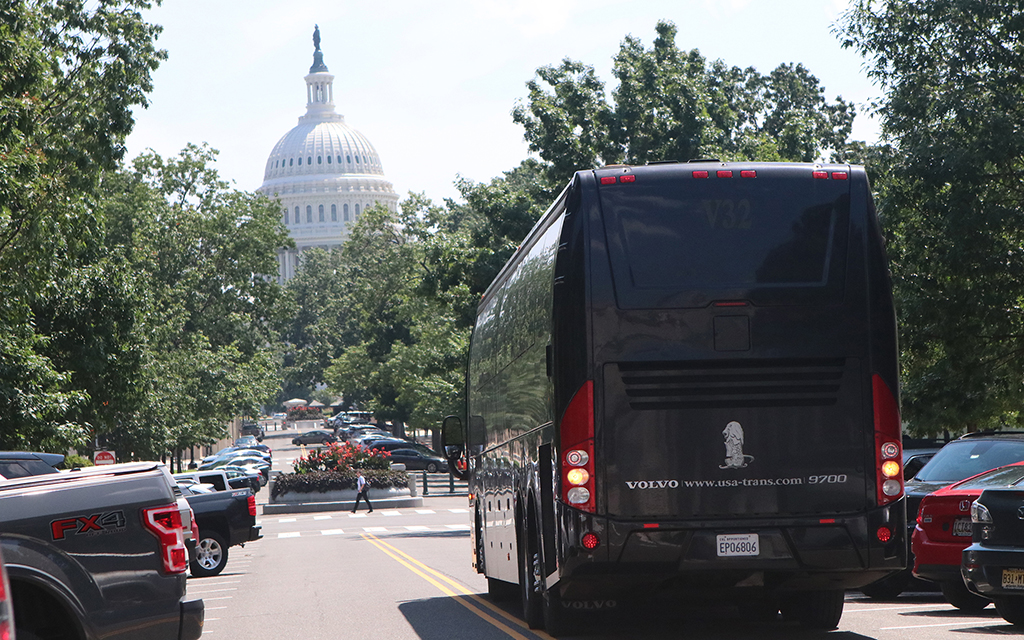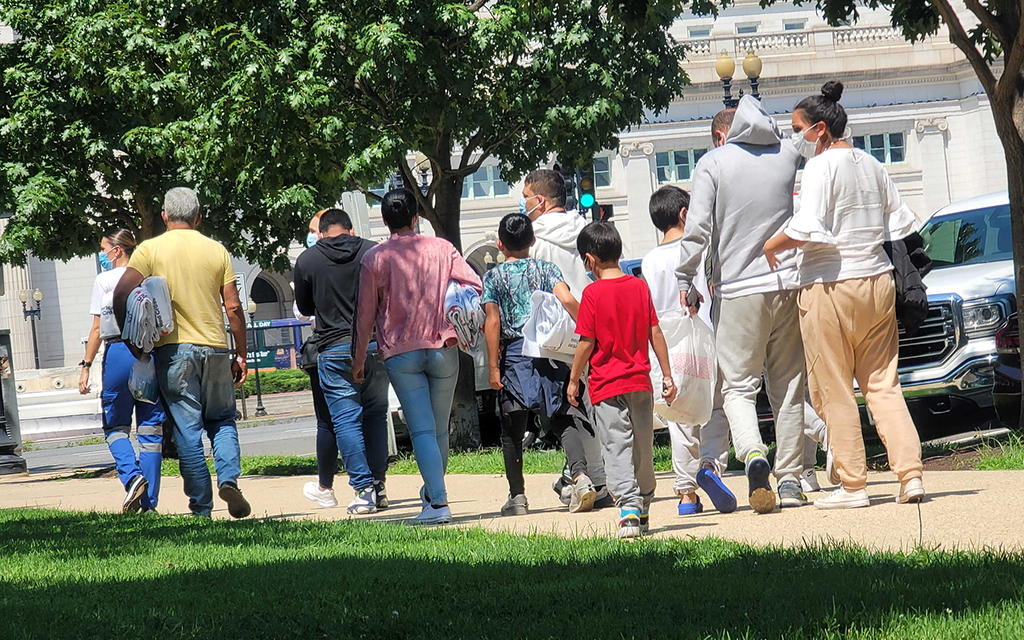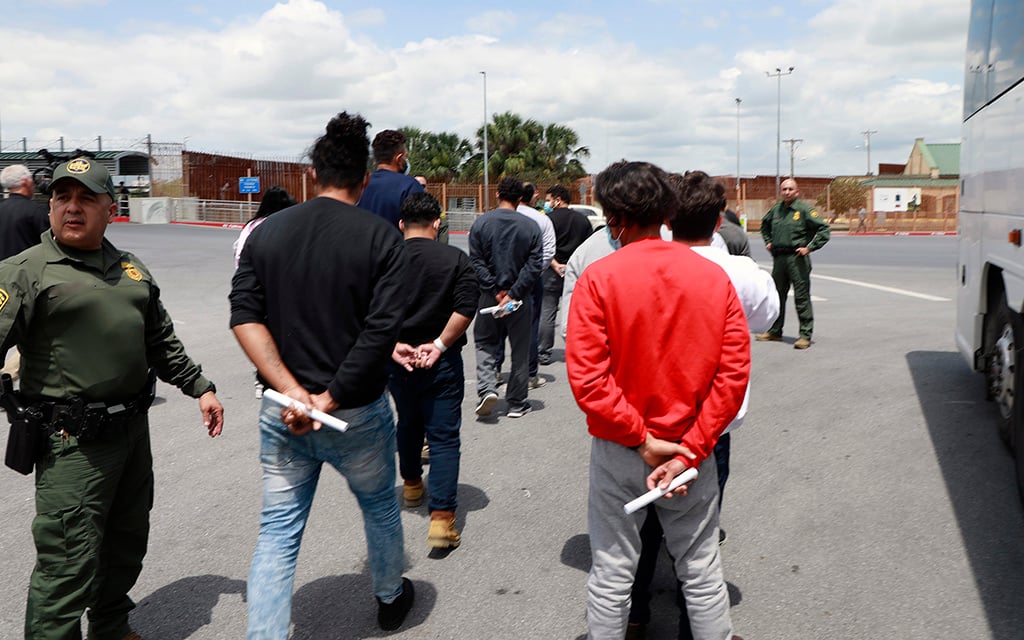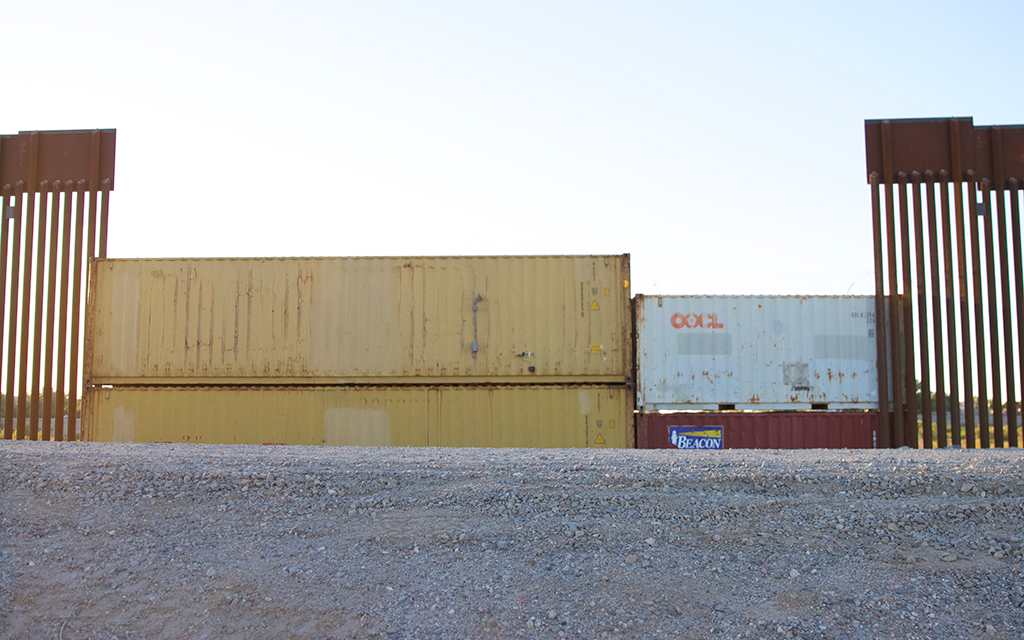
A bus that carried migrants from the border to Washington, D.C., idles near Union Station, just two blocks from the U.S. Capitol in this 2022 file photo. Arizona has bused more than 81,000 asylum-seekers away from the border – most to in-state locations before they moved on – since the program began in 2022. (File photo by Daisy Gonzalez-Perez/Cronkite News)
PHOENIX – Legislators on Tuesday approved an additional $8 million that will let the Department of Emergency and Military Affairs keep busing migrants away from border communities, a program that has transported more than 81,000 people since 2022.
It was just part of a $12.8 million budget transfer approved for DEMA border activities, including another $4.8 million to reimburse local police agencies and prosecutors that deal with border-related crimes.
But before approving the transfers, members of the Joint Legislative Budget Committee imposed safeguards to keep future spending in check. The DEMA request came after the agency spent almost all of a $15 million budget for migrant busing and $20 million for local law enforcement reimbursement.
Restrictions approved Tuesday will cap the cost of an in-state bus trip at $60 per person and will require DEMA to report to JLBC before approving reimbursements to any police agencies whose applications are not already in the pipeline. The money is being shifted from other areas of DEMA’s border security fund that have been underutilized.
DEMA Director Gabe Lavine told the committee that he had “serious concerns” about the two restrictions, calling them “impractical and infeasible for us to abide by.” But lawmakers said they were nonnegotiable.
“Otherwise, we can take the $8 million away. It’s really that simple,” said Rep. David Livingston, R-Peoria. “So, if you don’t understand that, I apologize. We have made that clear to the governor’s team.”
Christian Slater, a spokesperson for Gov. Katie Hobbs, confirmed that the governor’s office was involved in negotiations to extend the funding, but added that it was important to continue the programs.
“If there’s a need, we’re going to do whatever we need to do to meet that need to keep the border secure and make sure that border communities have the capacity they need to deal with this large influx of migrants,” Slater said.
The funding comes as migrant encounters at the southern border set a record of more than 300,000 in the month of December. In the first three months of fiscal 2024, according to Customs and Border Protection, more than 219,000 migrants were stopped in the Arizona sectors of the border.
A surge in migration led then-Gov. Doug Ducey in 2022 to join Texas and Florida in busing migrants out of state, to ease the strain on overburdened border communities. Arizona bused 3,177 asylum seekers to Washington, D.C., in 2022, a trip of more than 2,000 miles that cost the state more than $7.138 million, or $2,247 per person.
Hobbs campaigned against busing, and the number of migrants transported fell sharply in her first months in office. But she expanded the program in May, with DEMA busing migrants to in-state nongovernmental organizations for assistance, in addition to the trips to Washington.
Since then, the number of asylum seekers being bused has grown significantly. A total of 64,374 individuals were bused to in-state destinations in 2023, when another 8,415 individuals were transported to Washington. The program continues, with 5,485 people bused in just one week in January, according to a DEMA report.
The program now only accepts asylum seekers who have been processed by CBP and released to await an asylum hearing. Asylum seekers have to agree to be bused from the border towns where they are released, and are transported to NGOs that help care for them or send them on to their final destination.

An aid worker in this 2022 file photo leads a group of migrants into Washington’s Union Station to get food after they were dropped off by a bus the brought them from the border. The busing program has continued since then, and state lawmakers approved an $8 million fund transfer to continue it through the end of this fiscal year. (File photo by Neetish Basnet/Cronkite News)
Despite the surging numbers, the overall cost of the program has remained about the same and the per person cost has dropped sharply, to about $38 for in-state transportation.
Lawmakers seized on that number, with Sen. Sonny Borrelli, R-Lake Havasu City, at one point searching his phone to find the cost of a Greyhound bus ticket from Tucson to Phoenix was less than $60.
But Lavine said the $38 per-person cost does not paint the full picture. The cost of buses varies depending on when they are ordered, the time of day and distance traveled, among other factors, he said.
“If we have a bus that has less migrants on it, they’re moving from a further distance, that particular bus might cost more … which reduces our operational flexibility and ability to meet the needs of the local community,” Lavine said.
Fluctuations in the number of asylum seekers processed by CBP can make it difficult to coordinate bus pickups, which can make budgeting a challenge, Lavine said. A $60 cap could delay the process and leave asylum seekers released by CBP on the street without resources for 24 hours.
But Sen. John Kavanagh, R-Fountain Hills, did not see a problem with that.
“So we have people who have traveled hundreds, if not thousands of miles on foot, mostly, from other areas, other countries, and they can’t wait a day for you to fill a bus?” Kavanagh asked.
DEMA projects that without a “significant federal policy shift” the number of asylum seekers in Arizona will only increase in 2024.
Hobbs was one of nine Democratic governors who wrote a letter to President Joe Biden and congressional leaders last week calling on the federal government to address the “humanitarian crisis” caused by the massive influx of asylum seekers.
“Communities along the southern border – as well as interior states and cities across the country – lack the vast coordinated infrastructure needed to respond to the humanitarian and public safety concerns of those seeking lawful entry into the United States,” the letter said. “America needs a federal solution that supports our economy, immigrants and fixes our immigration system.”
Citing that need, Democrats on the committee pushed unsuccessfully to have the $12.8 million approved without any strings attached.
“We’ve got a crisis here and it’s a crisis of management,” said Rep. Stephanie Stahl Hamilton, D-Tucson. “And today we have a choice to either make that management work for everybody and be helpful, or to continue to place handcuffs on the people who work for us and make them come back to us in a month, in two months, as long as we’re in session, to ask for more help.”


